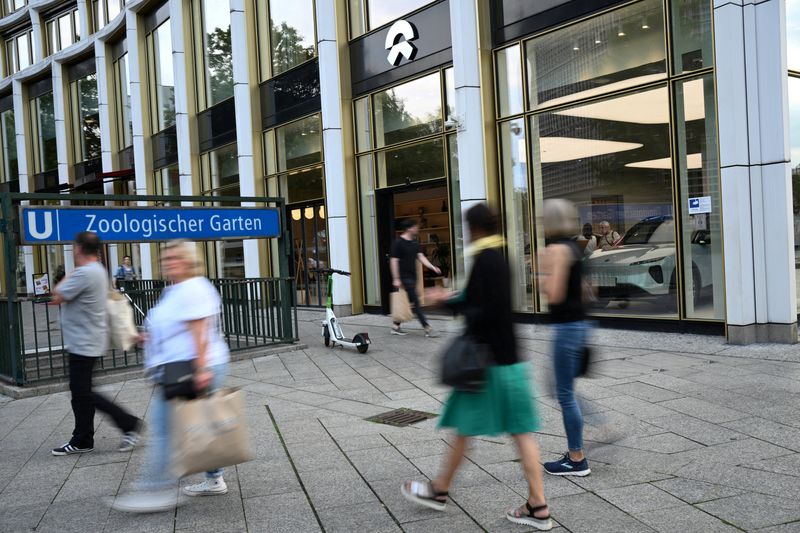By Christoph Steitz and Joseph White
MUNICH (Reuters) -Europe's car giants won't have much time to restructure their operations and product lines to compete with ascendant Chinese automakers, and stiffer tariffs will do little to protect the status quo, industry executives said during a Reuters event.
European trade regulators in Brussels have said they could levy new tariffs on Chinese electric vehicles based on the results of an investigation into Chinese government subsidies.
European Commission President Ursula von der Leyen on Tuesday said that Europe would take a "tailored approach" to its investigation and any potential duties imposed will be "correspondent to the level of damage". It will inform those Chinese EV makers incurring provisional tariffs by June 5.
But industry executives said that Brussels cannot prevent the reckoning that China's lower cost EVs will force on European automakers and their traditional suppliers.
Chinese carmakers, which command a 30% or more cost edge over European rivals, took 19% of Europe's EV market last year, up from 16% in 2022, according to the Rhodium Group.
"And the window is closing. From my point of view, we have two or three years. If we are not fast...it will be really tough (for German industry) to survive," Thomas Schmall, a board member at Europe's top carmaker Volkswagen (ETR:VOWG_p), said at the Reuters Events Automotive conference in Munich.
"Today, it is no longer size that guarantees survival, but speed," he told Reuters.
Stellantis (NYSE:STLA) CEO Carlos Tavares said carmakers "don't have much time" to adjust their businesses and depended on the removal of "regulatory chaos and the bureaucracies that we have in our backyard".
The surge in Chinese exports, and the prospect of Chinese factories within Europe, are forcing the continent's incumbent automakers to explore partnerships with long-time rivals, turn up pressure on suppliers to cut costs, and intensify discussions with European unions over the future of plants and jobs, executives said.
Some of these tactics are stumbling out of the gate.
Renault (EPA:RENA) and VW last week pulled the plug on talks to develop lower-cost EVs over disagreements about where to make the car.
Europe's automakers are dealing with "a form of competitive asymmetry" not only with China but with U.S. clean vehicle subsidies, Renault CEO Luca de Meo told Reuters on the sidelines of the VivaTech summit in Paris. "In the end, the best thing you can do is be competitive."
Underscoring the scale of China's ambition overseas, founder of Chinese electric car manufacturer NIO William Li said on Thursday he plans to continue expanding in Europe even with the uncertainty over tariffs.
He was in Amsterdam to open a new showroom in the busiest part of the city.
LABOUR COSTS
Cutting labour costs has never been easy in Europe where unions have political and legal levers to block layoffs.
"The quality of the dialogue that we have with European unions is quite high," Tavares said. "They see the trap and they see how we are trying to manage and to navigate through this situation."
The threat of fewer auto jobs has mobilised European politicians such as Italian Prime Minister Giorgia Meloni, who wants Stellantis to increase its annual output in Italy to one million vehicles from around 750,000 in 2023, rather than move production to low-cost countries.
Fiat Chrysler, which merged with France's PSA in 2021 to create Stellantis, last produced more than one million vehicles in the country - including passenger cars and light commercial vehicles - in 2017.
Since the merger, Stellantis has cut its European workforce by 13% to around 125,000, mostly through voluntary lay-offs agreed with unions and with more than half in Italy.
Volkswagen has a target to cut 10 billion euros ($10.8 billion) in costs by 2026, and some of those savings could come through early retirement of workers, Chief Financial Officer Arno Antlitz said at the Reuters Events conference on Thursday.
"Specifically our German plants have to prepare for tougher competition," Antlitz said.
COMPETITIVE PRICES
Stellantis is launching a small electric Citroen at 20,000 euros, which Tavares said was "at the right price" to compete with Chinese automakers, whose hefty cost advantage is all too clear to their European rivals thanks to partnerships between the companies.
Stellantis' global purchasing chief Maxime Picat said in an interview in Munich that the automaker is pushing its suppliers to match Chinese supplier costs, in part using data gathered from its partnership with China's Leapmotor (HK:9863).
Tariffs can temporarily shrink or eliminate the cost advantage Chinese automakers get from their supply chains.
But Germany's automakers warn that could come at a high price if China goes beyond threats to slap duties on French cognac and retaliates with tariffs on Mercedes-Benz (OTC:MBGAF), VW or BMW (ETR:BMWG) vehicles made in Europe. Mercedes generates about 16% of its global revenue in China.

For more on the battle with Chinese automakers over the market for electric vehicles listen now to the Reuters Econ World podcast.
($1 = 0.9225 euros)